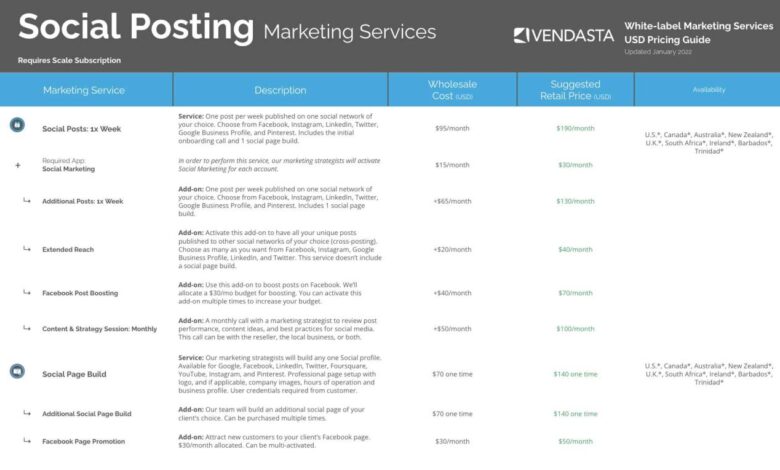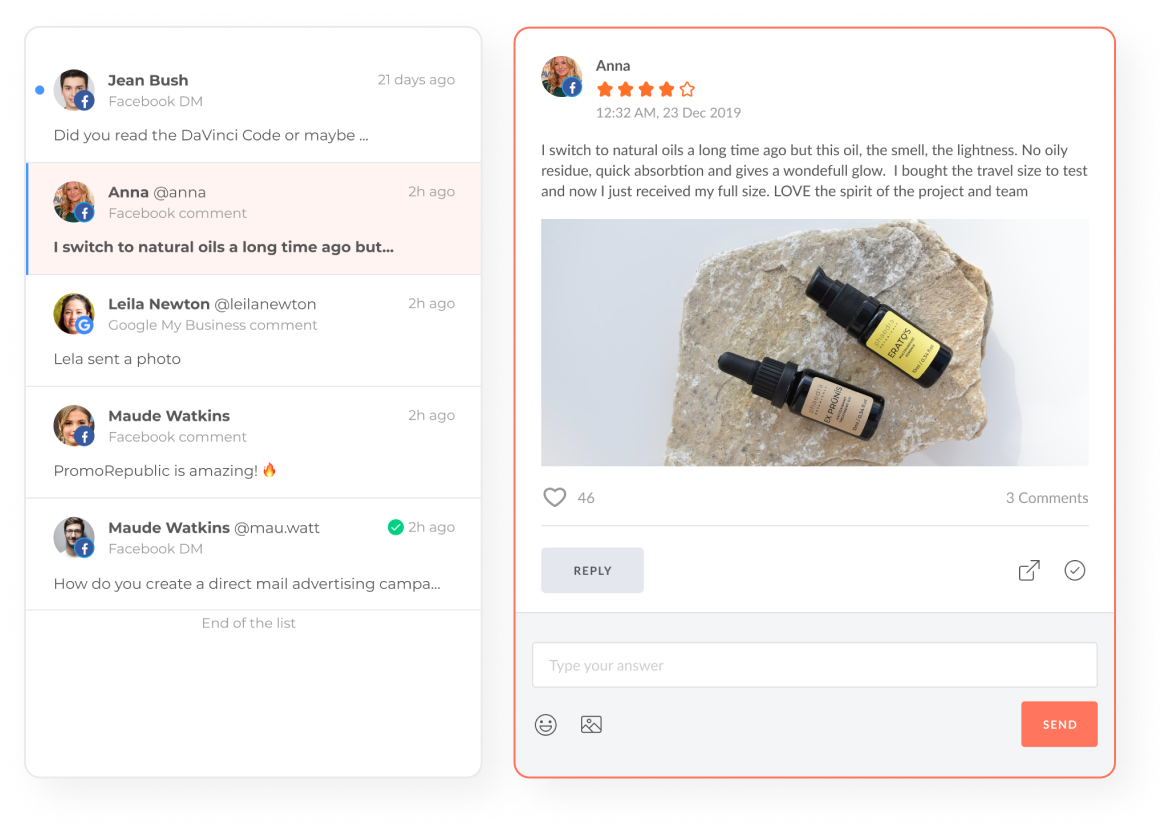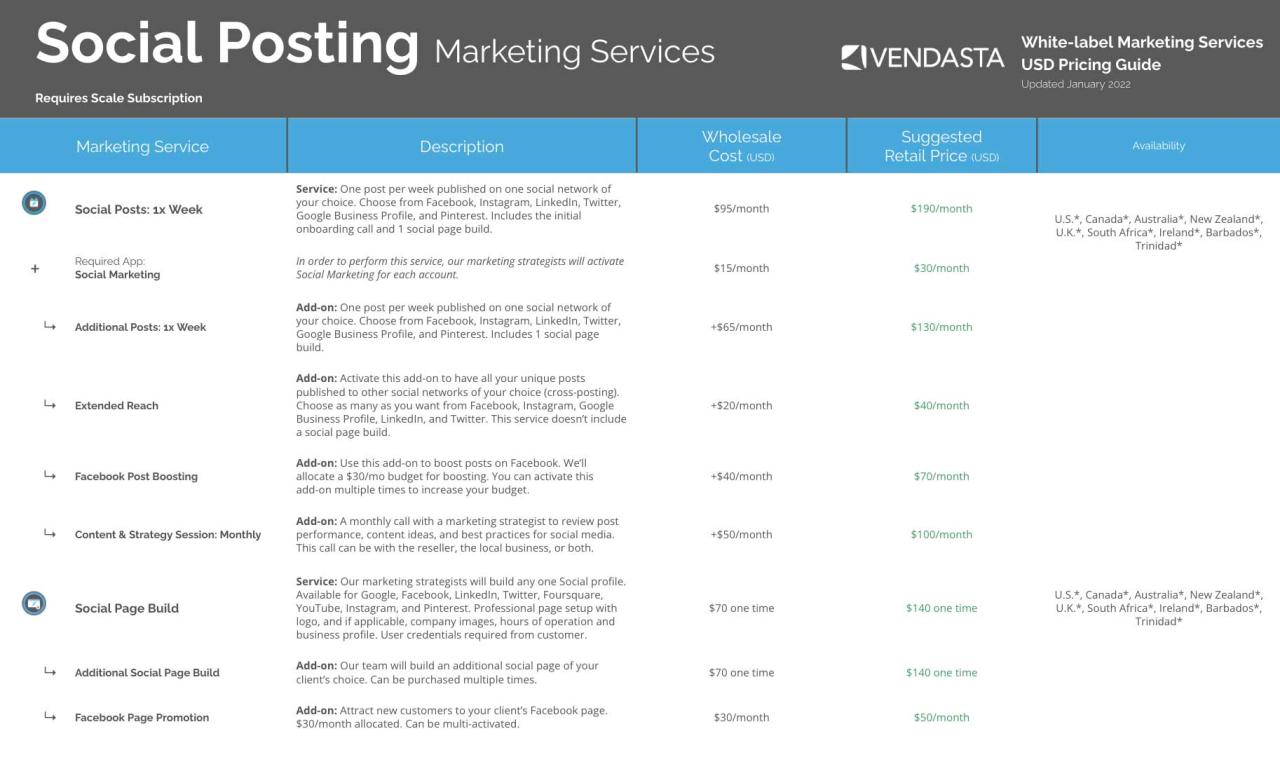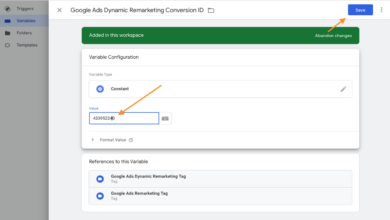
White Label Social Media Management All You Need to Know
White label social media management all you need to know covers everything from defining the service to understanding pricing strategies, tools, and client support. This comprehensive guide dives into the intricacies of offering white label social media management, exploring the benefits for both resellers and clients. We’ll unpack the key features, discuss pricing models, and examine essential tools and technologies.
Learn about client onboarding, security, and the future of this growing industry.
From understanding the core features of a white label social media management platform to exploring the legal and contractual aspects, this guide provides a thorough overview of the essential elements involved. This detailed exploration is designed to equip you with the knowledge needed to succeed in the white label social media management industry.
Introduction to White Label Social Media Management: White Label Social Media Management All You Need To Know
White label social media management is a service model where a company (the provider) offers social media management tools and expertise to other businesses (the reseller or client). Essentially, the provider handles all the social media activities for the reseller’s clients, but the reseller maintains the brand identity and relationship with the client. This allows resellers to offer comprehensive social media solutions without the overhead of building and maintaining an in-house team.This model fosters a mutually beneficial partnership, where the provider benefits from scalability and a wider reach, while the reseller gains a valuable service to offer clients and expand their business offerings.
This system is particularly beneficial for companies looking to outsource social media management or those who don’t have the resources to manage social media in-house.
Key Components of a White Label Service
A white label service encompasses several key components. It involves a pre-defined set of social media management tools and services, a customizable branding platform, and a streamlined support structure to ensure the client experience is seamless. The reseller can leverage the provider’s established expertise and technology while maintaining their own brand identity.
Characteristics of a White Label Social Media Management Service
Key characteristics include:
- Brand Independence: The reseller maintains their brand identity and relationship with their client.
- Customizable Branding: The reseller can customize the branding and visual identity of the service to align with their clients’ needs and their own brand.
- Scalability and Flexibility: The service can adapt to different client needs and service offerings, catering to a diverse range of businesses.
- High Quality and Efficiency: The provider should maintain high standards for service quality and operational efficiency.
- Streamlined Support: A comprehensive support system is crucial for managing client issues effectively and promptly.
Types of White Label Social Media Management Solutions
Various types of white label social media management solutions cater to diverse needs and budgets.
- Basic Social Media Management Packages: These packages typically include scheduling posts, responding to comments, and basic analytics reporting. They are suited for businesses with smaller social media needs.
- Comprehensive Social Media Management Packages: These packages often include advanced features such as content creation, influencer marketing, paid advertising management, and detailed reporting. These are more suitable for businesses requiring a wider range of social media services.
- Customized Social Media Management Solutions: These services allow businesses to tailor the social media management process to their specific needs and goals. They can include specific features like crisis management plans or detailed competitor analysis.
Examples of Successful White Label Social Media Management Strategies
Successful white label strategies frequently involve strong brand building, tailored solutions, and excellent customer service. One successful approach focuses on providing customized packages based on client industry and size. Another approach involves creating unique social media templates for different business types to help accelerate onboarding and streamline the service delivery. A key component is establishing clear communication channels and a well-defined process to ensure consistent service quality across all clients.
So, you’re diving into white label social media management? Knowing how to track your campaigns effectively is key. A crucial element is setting up your Meta Pixel (formerly Facebook Pixel), which lets you understand audience engagement and optimize your strategies. Check out our detailed guide on how to set up Meta Pixel formerly Facebook Pixel for a step-by-step walkthrough.
Once you’ve got that nailed down, you’ll be well-equipped to manage your white label social media accounts with precision and confidence, ensuring your clients see maximum results.
Potential Benefits of Offering White Label Social Media Management, White label social media management all you need to know
By offering white label social media management, businesses can expand their service offerings, reach a wider client base, and increase revenue streams without the burden of managing client accounts directly. This can be a significant advantage for businesses looking to scale their operations.
Core Features of White Label Social Media Management
White label social media management platforms empower businesses to offer comprehensive social media solutions to their clients without the overhead of building and maintaining their own social media presence. These platforms offer a sophisticated suite of tools, allowing for streamlined management, increased efficiency, and enhanced client satisfaction. This allows businesses to focus on their core competencies, while delegating the often-complex task of social media to a reliable and trustworthy provider.A key aspect of a successful white label social media management platform is its ability to offer a wide range of features, tailored to the specific needs of different clients.
This includes sophisticated analytics and reporting tools, robust content creation and scheduling capabilities, and effective community management and engagement strategies. These features are crucial for providing value and demonstrating the platform’s potential to clients.
Social Media Analytics and Reporting
Comprehensive social media analytics are critical for understanding performance, identifying trends, and optimizing strategies. A white label platform should provide detailed insights into key metrics, such as engagement rates, reach, and conversion rates, across various social media channels. Customizable reports should allow clients to track progress, identify areas for improvement, and demonstrate the value of the platform’s services.
This crucial feature ensures informed decision-making for clients, leading to better campaign performance.
Content Creation and Scheduling
A powerful content creation and scheduling feature is essential for maintaining a consistent and engaging presence across social media platforms. The platform should provide tools for developing high-quality content, including image editors, video creation capabilities, and templates for various social media formats. Scheduling features allow for strategic posting times, maximizing visibility and engagement with target audiences. Automated posting options and integrations with other tools are beneficial for increased efficiency.
For instance, a platform might integrate with a blog platform to schedule posts directly from blog articles.
Community Management and Engagement
Effective community management is vital for building brand loyalty and fostering meaningful interactions with followers. The white label platform should facilitate seamless communication and interaction with clients’ audiences, including tools for responding to comments and messages, managing mentions, and moderating conversations. Automated responses and pre-written messages can save time and ensure prompt client support. Features that identify key influencers and brand advocates are highly valuable, empowering clients to cultivate strong relationships within their online communities.
Customizable Dashboards and Reporting Tools
White label clients often require tailored dashboards and reports to visualize key performance indicators (KPIs). A platform should offer customizable dashboards that allow clients to track specific metrics relevant to their business goals. Reports should be exportable in various formats (e.g., CSV, PDF) for easy analysis and sharing with clients. A platform should also offer options to segment data by specific campaigns or social media channels, enabling clients to evaluate individual campaign performance.
For instance, a client managing a fashion brand might want a dashboard focusing on website traffic from social media campaigns, allowing them to see how each platform performs in driving conversions. Visualizations like charts and graphs can present this data effectively.
Benefits and Advantages for Clients
White label social media management offers a powerful solution for businesses looking to enhance their online presence without the burden of in-house expertise. By leveraging a dedicated team of social media specialists, businesses can free up internal resources and focus on core competencies, ultimately driving growth and efficiency. This approach allows businesses to achieve a significant return on investment (ROI) while maintaining control over their brand image and message.Businesses can gain significant advantages by outsourcing their social media management.
Instead of hiring and training dedicated staff, businesses can access a wealth of social media management experience, tools, and strategies, all without the associated costs of salaries, benefits, and office space.
Time and Resource Savings
Outsourcing social media management through a white label solution frees up valuable time and resources. Businesses can delegate the day-to-day tasks of content creation, scheduling, monitoring, and engagement, allowing internal teams to concentrate on other crucial aspects of the business. This frees up staff to focus on higher-level tasks, leading to increased productivity and efficiency. Imagine a small startup; they can utilize the white label service to focus on product development and sales instead of being bogged down by social media management.
Scalability and Flexibility
White label social media management solutions provide businesses with unparalleled scalability and flexibility. As a business grows and its social media needs evolve, the service can easily adapt to accommodate increased demands. This adaptability allows for a seamless transition from managing a small social media presence to handling a more extensive and complex online strategy. This is crucial for companies experiencing rapid growth.
Wider Audience Reach
Utilizing white label social media management services allows businesses to reach a wider audience compared to traditional in-house methods. Social media managers, equipped with the latest tools and strategies, can effectively target specific demographics and interests, leading to greater visibility and engagement. This increased reach translates to more potential customers and higher conversion rates.
Comparison: In-House vs. White Label
| Feature | In-House Social Media Management | White Label Social Media Management |
|---|---|---|
| Cost | High (salaries, benefits, training) | Lower (access to expertise without the associated overhead) |
| Expertise | Dependent on internal team’s skills | Leverages experienced social media professionals |
| Scalability | Limited by internal team capacity | Scalable to accommodate growth |
| Flexibility | Rigid based on internal team’s availability | Flexible and adaptable to changing needs |
| Time Commitment | Requires dedicated staff and time | Frees up internal resources for core business functions |
A well-structured comparison highlights the distinct advantages of white label social media management over in-house solutions, offering significant cost savings and efficiency gains for businesses.
Benefits and Advantages for Resellers

Reselling white-label social media management services can be a highly lucrative venture. It allows businesses to offer a valuable service without the overhead and complexities of building their own social media management infrastructure. This model empowers resellers to focus on client acquisition and relationship management, while leveraging the expertise of a specialized provider.The core advantage lies in the ability to package and present a premium service under your own brand, generating significant profit margins.
This streamlined approach empowers resellers to cultivate a strong brand identity, expand their client base, and establish themselves as industry experts.
Profit Margin Potential
White-label solutions offer significant profit potential due to the cost savings of not having to build and maintain internal social media management teams. Resellers can leverage this cost advantage by setting their own pricing strategies. A well-defined pricing model, incorporating factors like client needs, service packages, and the value proposition, allows resellers to generate substantial returns on their investment.
For instance, a reseller can charge a premium on top of the white-label service fee to reflect the value added through their marketing and sales efforts. This results in a higher profit margin compared to simply reselling a product without any added value.
Building a Strong Brand Identity
White-labeling empowers resellers to project a strong brand identity. By presenting the service under their own brand, resellers can tailor the branding and messaging to align with their target audience and overall marketing strategy. A professional, consistent brand identity fosters trust and credibility with clients, attracting a loyal customer base. This includes developing unique branding elements, creating a distinctive visual identity, and establishing a strong online presence.
Resellers can position themselves as trusted advisors, specializing in social media management.
Successful Reseller Models
Several successful reseller models exist for white-label social media management. One prevalent model involves partnering with a provider who offers a flexible service package that can be customized to meet the specific needs of various client segments. This allows resellers to cater to diverse client needs, positioning them as adaptable and knowledgeable experts. Another successful model is to specialize in a specific niche market, like small businesses or e-commerce stores.
This allows for focused marketing and building a reputation as the go-to provider in that niche. A third model is to integrate white-label social media management into other services, such as website design or marketing consultation packages, creating a more comprehensive offering for clients.
Marketing and Promotion Strategies
Effective marketing and promotion strategies are essential for successful white-label service reselling. This involves showcasing the value proposition to target clients, highlighting the benefits of social media management, and emphasizing the reseller’s expertise and reputation. Targeted advertising campaigns, content marketing, and strategic partnerships can significantly enhance visibility and attract potential clients. Additionally, showcasing successful client testimonials and case studies can build trust and credibility.
A strong online presence, including a well-designed website and active social media engagement, is crucial for reaching the target audience. Furthermore, participating in industry events and networking with potential clients can foster relationships and expand market reach.
Pricing and Packaging Options
Setting the right price for your white-label social media management service is crucial for profitability and attracting clients. A well-defined pricing structure demonstrates value and allows you to scale your offerings effectively. This section details various packaging options, tiered pricing models, and volume-based pricing to meet diverse client needs.A robust pricing strategy should be adaptable to different client needs and service levels.
A transparent and well-communicated pricing structure fosters trust and helps clients understand the value they’re receiving.
Sample Pricing Structure
Different clients have different needs, from basic social media posting to comprehensive campaign management. This structure reflects varying service levels.
| Package | Monthly Fee | Key Features |
|---|---|---|
| Basic Package | $250 | Includes posting on 2 social media platforms, scheduling posts, and basic engagement. |
| Standard Package | $500 | Covers posting on 3-5 social media platforms, scheduling, engagement, and basic analytics reporting. |
| Premium Package | $1000 | Provides comprehensive management across all major platforms, including content creation, paid advertising, advanced analytics, and custom reporting. |
Package Features
Each package offers a distinct set of features, ensuring clients receive value aligned with their budget.
- Basic Package: Covers the fundamental needs of smaller businesses or individuals with limited social media presence. This package focuses on establishing a basic online presence and consistent posting.
- Standard Package: This package adds advanced features for a broader range of clients. It includes engagement management, analytics, and expanded social media platform coverage.
- Premium Package: Tailored for businesses requiring extensive management and advanced strategies. This package encompasses complete campaign management, including content creation, paid advertising, and sophisticated reporting.
Tiered Pricing Structure
Pricing tiers are designed to accommodate varying client needs. The structure is progressive, with each tier adding more comprehensive features and services. For example, a small business might begin with the Basic package and transition to the Standard package as their social media presence grows.
Pricing Models for Client Volume
Volume-based pricing models offer flexible options for managing multiple client accounts. A tiered pricing system can be adjusted based on the number of clients or the overall engagement level. This is ideal for agencies looking to scale their services. For instance, a reseller managing 50 clients could benefit from a discounted per-client rate compared to a reseller managing 10 clients.
Essential Tools and Technologies
White label social media management thrives on a robust toolkit. The right combination of tools streamlines processes, enhances client communication, and delivers measurable results. These technologies are the backbone of a successful white label operation, enabling resellers to effectively manage client accounts and generate revenue.Effective white label social media management requires a suite of specialized tools. These tools empower resellers to handle multiple client accounts efficiently, ensuring high-quality service and consistent results.
So, you’re diving into white label social media management? Great! Understanding the core benefits of social media for business is key. For example, increased brand visibility, amplified customer engagement, and targeted advertising campaigns are all major advantages. To learn more about the 4 most visible benefits of social media for business, check out this insightful article: 4 most visible benefits of social media for business.
Ultimately, grasping these advantages is crucial for effective white label social media management. You’ll be well-equipped to scale and offer valuable services to your clients.
Furthermore, these tools contribute to improved client satisfaction and ultimately, greater profitability for the reseller.
Essential Social Media Management Tools
A core component of any white label social media management solution is a comprehensive social media management platform. These platforms are designed to streamline tasks, schedule posts, track performance, and manage multiple social media accounts simultaneously. Choosing the right platform is crucial for efficiency and ensuring that all client accounts receive the attention they deserve. These tools facilitate scheduling posts across various platforms, providing insights into audience engagement and performance.
- Social Media Scheduling Tools: These tools allow for automated posting across multiple platforms, saving time and resources. Hootsuite, Buffer, and Sprout Social are popular examples, enabling consistent and strategic content distribution.
- Analytics Platforms: Data analysis is fundamental for optimizing social media strategies. Tools like Google Analytics and social media platform analytics dashboards provide valuable insights into audience engagement, campaign performance, and overall ROI. They allow resellers to understand what’s working and what’s not, helping clients achieve their goals.
- Content Creation Tools: Tools for image editing, graphic design, and video creation are vital for producing high-quality visual content. Canva, Adobe Photoshop, and other similar platforms allow for customized graphics and video content that resonates with different audiences.
Integration of Social Media Platforms
A key aspect of a white label solution is the seamless integration of various social media platforms. This allows resellers to manage multiple client accounts on different platforms from a single dashboard. This integration streamlines workflows, ensuring that clients’ accounts receive the same level of attention and care.
- Unified Dashboard: A single dashboard offering access to all client accounts on various platforms is crucial. This allows resellers to monitor performance, manage posts, and respond to interactions across different social media channels without needing to switch between various platforms.
- Automated Posting: Integration with multiple platforms allows for automated posting schedules, ensuring consistency and maintaining a strong online presence for each client. This automated scheduling feature minimizes the time resellers spend on manual posting.
Role of CRM Systems
A robust Customer Relationship Management (CRM) system is essential for managing client interactions and maintaining a strong relationship. A CRM system in white label social media management can help track client data, manage communication, and store important details.
- Client Data Management: CRM systems centralize client data, including contact information, project details, and communication history. This enables resellers to understand each client’s specific needs and preferences.
- Communication Tracking: CRM systems facilitate the tracking of communication with clients, providing a record of all interactions and keeping communication organized. This helps resellers ensure timely and relevant responses to client inquiries.
- Improved Client Relationship Management: By storing and accessing client data easily, CRM systems allow for a deeper understanding of client needs and preferences, enabling resellers to tailor their strategies and enhance the client experience. This translates to stronger client relationships and ultimately, greater client satisfaction.
Popular Tools Used by White Label Social Media Managers
A range of tools are used by white label social media managers to enhance their services. This list provides a glimpse into the diverse tools utilized.
| Tool | Description |
|---|---|
| Hootsuite | A comprehensive social media management platform that allows for scheduling, monitoring, and reporting across various social media platforms. |
| Buffer | A social media scheduling tool that allows for automated posting across multiple platforms. |
| Sprout Social | A social media management platform offering advanced analytics and reporting features. |
| Canva | A graphic design tool for creating engaging visuals for social media posts. |
| Google Analytics | Provides data analysis and insights into website and social media performance. |
Client Onboarding and Support
Smooth client onboarding is crucial for long-term success in white label social media management. A well-structured process, combined with excellent communication and dedicated support, ensures client satisfaction and builds strong, lasting relationships. Effective onboarding fosters trust and understanding, setting the stage for a successful partnership.A robust onboarding process and readily available support are vital components for establishing a positive client experience.
This proactive approach reduces client anxieties and establishes clear expectations, ultimately leading to a higher rate of client retention. Dedicated account managers play a key role in this process, ensuring clients feel supported and well-informed throughout their journey.
Client Onboarding Process
A comprehensive onboarding process streamlines the transition for new clients, minimizing confusion and maximizing productivity. It involves a series of steps, from initial contract signing to comprehensive training on the platform. This systematic approach ensures all parties are on the same page, setting the stage for successful collaboration.
- Initial Client Meeting: A dedicated onboarding meeting provides a platform for clarifying expectations, goals, and project scopes. This meeting allows for personalized discussions, addressing individual client needs and concerns.
- Platform Access & Training: Secure access to the platform and comprehensive training sessions are crucial. This ensures clients can efficiently manage their social media accounts and utilize the available features.
- Account Configuration & Setup: A dedicated team assists clients in configuring their accounts, tailoring settings to their specific brand identity and social media strategy. Detailed instructions and support guides are provided for optimal configuration.
- Content Calendar Integration: Integrating content calendars into the system enables clients to schedule and manage posts effectively. Guidance and training on utilizing this tool is offered to clients, ensuring optimal usage.
Clear Communication and Client Training
Open and transparent communication is paramount in establishing strong client relationships. Regular updates and progress reports keep clients informed, fostering trust and transparency. Thorough client training empowers them to effectively utilize the platform, enhancing their overall experience.Training materials, including video tutorials and user manuals, should be readily accessible and comprehensive. Clear communication protocols and response times establish expectations and maintain a high level of client satisfaction.
Role of Dedicated Account Managers
Dedicated account managers act as the primary point of contact for clients. Their role extends beyond technical support, encompassing proactive communication, understanding client needs, and providing personalized guidance. This personalized approach builds rapport and strengthens the client-reseller relationship.
Account managers should act as advocates for their clients, ensuring they feel heard and valued.
Account managers actively monitor client performance, identify areas for improvement, and proactively suggest solutions to optimize results. Regular check-ins and feedback sessions ensure clients remain engaged and satisfied.
Sample Client Onboarding Checklist
- Welcome Email/Package Delivery
- Initial Client Meeting (Video Conference)
- Platform Access Setup
- Client Account Training (Webinars)
- Content Calendar Integration Training
- Account Configuration & Brand Guidelines Implementation
- Follow-up Check-in Call
- Ongoing Support & Reporting
Support Options and Costs
Different support options cater to various client needs and budgets. A tiered approach ensures clients receive the level of support that best suits their requirements.
| Support Option | Description | Cost |
|---|---|---|
| Basic Support | Limited email responses, self-help guides, and FAQs. | $XX/month |
| Standard Support | Dedicated account manager, weekly check-ins, and monthly reports. | $YY/month |
| Premium Support | 24/7 access to account managers, priority support, and customized training. | $ZZ/month |
Security and Privacy Considerations

Protecting client data and intellectual property is paramount in white-label social media management. Maintaining trust and upholding ethical standards are crucial for the long-term success of both the reseller and their clients. Robust security measures are essential to prevent breaches and ensure compliance with data protection regulations.Comprehensive security protocols, coupled with a commitment to privacy, build client confidence and foster a positive reputation.
A secure platform safeguards sensitive information, protecting clients from potential financial and reputational damage.
Importance of Data Security and Privacy
Data security and privacy are not just good practices; they are legally mandated in many jurisdictions. Failing to adhere to data protection regulations can result in substantial fines and reputational harm. Client data, including personal information and business secrets, needs safeguarding against unauthorized access, use, or disclosure.
Compliance with Relevant Regulations
Adhering to data protection regulations like GDPR, CCPA, and others is critical. Understanding and implementing the requirements of these regulations is essential for avoiding legal issues. This involves implementing policies and procedures that comply with the specific requirements of each jurisdiction where clients operate. For example, GDPR mandates specific rights for data subjects, including the right to access, rectify, and erase their personal data.
Protecting Client Data and Intellectual Property
Protecting client data and intellectual property requires a multi-layered approach. Strong passwords, multi-factor authentication, and regular security audits are vital components. Secure storage of client data, using encryption and access controls, is equally important. Regularly reviewing and updating security protocols, including data backup and disaster recovery plans, is essential. A robust approach to handling sensitive data minimizes the risk of breaches and ensures compliance.
Measures for Protecting Client Data
Implementing encryption protocols for data transmission and storage is crucial. Access controls should limit access to sensitive data to authorized personnel only. Regular security audits, including vulnerability assessments, are necessary to identify and address potential security gaps. Employing intrusion detection and prevention systems to monitor network activity and detect anomalies is a vital step.
Importance of Robust Security Protocols
Robust security protocols are not just a technical requirement; they represent a commitment to client trust and ethical business practices. Using strong passwords, multi-factor authentication, and regular software updates are fundamental. Implementing strong encryption methods is essential for protecting data during transmission and storage.
Potential Security Risks and Mitigation Strategies
Potential security risks include phishing attacks, malware infections, and data breaches. Regular security awareness training for staff is essential to mitigate these risks. Developing incident response plans and conducting regular security drills are crucial for handling security incidents effectively. Monitoring and responding to suspicious activities in real-time can prevent significant damage. Implementing firewalls and intrusion detection systems are critical defensive measures.
Examples of Security Best Practices
Implementing regular security audits to identify and address potential vulnerabilities. Utilizing strong encryption methods for data transmission and storage. Establishing clear security policies and procedures for all employees and contractors. Conducting regular security awareness training for staff to educate them about potential threats and how to avoid them. Utilizing multi-factor authentication to enhance account security.
Legal and Contractual Aspects
Navigating the legal landscape is crucial for any white label social media management service. Clear contracts, understanding legal implications, and robust terms of service are essential to protect both your business and your clients. This section Artikels the key legal and contractual considerations for a successful white label operation.A strong foundation in legal and contractual aspects safeguards your business and builds trust with clients.
So, you’re diving into white label social media management? Excellent choice! Knowing the ins and outs of this can be a game-changer for your clients. But, successful social media management often hinges on a well-rounded strategy, including a strong understanding of email marketing. Learning what is email marketing is key to maximizing your clients’ reach.
Ultimately, mastering white label social media management involves much more than just posting on platforms; it’s about crafting a complete online presence.
By addressing intellectual property, confidentiality, and other relevant issues upfront, you mitigate potential disputes and ensure a smooth, profitable relationship.
Clear and Comprehensive Contracts
Contracts are the bedrock of any business relationship. They establish expectations, responsibilities, and boundaries. A well-crafted contract for white label social media management should clearly Artikel the scope of services, payment terms, termination clauses, and dispute resolution procedures. This clarity minimizes misunderstandings and potential legal issues down the road.
Legal Considerations in White Label Social Media Management
Legal considerations encompass various aspects, including data privacy regulations (like GDPR or CCPA), advertising compliance, and intellectual property rights. Understanding and adhering to these regulations is vital to avoid penalties and maintain a strong reputation. The specific laws applicable depend on the jurisdiction where you operate and your clients reside.
Terms of Service and Intellectual Property Rights
Terms of service documents define the rules and guidelines for client interactions. These terms must be explicit about who owns the content created for the client and any intellectual property rights associated with it. Ensure the contract clearly states that the client retains ownership of their content unless explicitly stated otherwise.
Implications of Non-Disclosure Agreements (NDAs)
Non-disclosure agreements (NDAs) protect confidential information exchanged between your company and clients. These agreements prevent unauthorized disclosure of sensitive data, such as client strategies, marketing plans, or financial details. An NDA is essential when handling confidential client information. Failure to implement an NDA could lead to significant reputational damage and potential legal repercussions.
Sample Contract Clause Related to Client Confidentiality
“The Reseller agrees to maintain the confidentiality of all information provided by the Client, including but not limited to, marketing strategies, financial data, customer lists, and any other proprietary information. The Reseller shall not use or disclose such information for any purpose other than the provision of agreed-upon social media management services to the Client. This obligation of confidentiality shall survive the termination of this Agreement.”
Future Trends and Innovations
The landscape of social media management is constantly evolving, and white label providers must adapt to stay ahead of the curve. Emerging technologies and shifting user behaviors are creating new opportunities and challenges for businesses seeking to leverage social media effectively. This section explores key future trends and their potential impact on white label social media management solutions.The future of white label social media management will be defined by innovation and adaptability.
Providers who anticipate and integrate emerging trends will position themselves for success in a rapidly changing digital environment. This includes embracing automation, AI, and seamless integrations with other marketing channels. Ultimately, the goal is to provide clients with sophisticated, streamlined, and efficient social media management solutions that remain competitive in the ever-evolving digital landscape.
Emerging Trends in White Label Social Media Management
White label social media management solutions are evolving beyond basic scheduling and posting. New trends include a greater emphasis on performance tracking, AI-powered insights, and personalized content strategies. These features allow resellers to provide more comprehensive and effective services to their clients, boosting their value proposition. The rise of social commerce and the increasing importance of influencer marketing are driving this shift.
AI and Automation in White Label Solutions
AI is poised to revolutionize social media management, particularly within white label solutions. AI-powered tools can analyze large datasets of social media data to identify trends, optimize content performance, and personalize interactions with target audiences. Automated scheduling, content creation, and customer service responses are becoming more sophisticated and accurate. For example, some platforms use AI to suggest the best time to post based on audience engagement patterns.
Future of Social Media Management
Social media management is no longer solely about posting updates. The future lies in creating engaging experiences, building authentic connections, and fostering community. White label solutions need to incorporate tools that allow clients to cultivate relationships with their audience. Interactive features like polls, Q&As, and live streams will become more prevalent, requiring white label providers to develop strategies to facilitate these experiences.
Potential Integrations with Other Marketing Channels
White label social media management solutions will increasingly integrate with other marketing channels, like email marketing, search engine optimization (), and paid advertising. This integrated approach will allow for a more holistic and comprehensive marketing strategy. For example, a white label solution could automatically populate email newsletters with content from a client’s social media feeds. This approach will enable a seamless customer journey and allow clients to track the performance of their integrated campaigns more effectively.
Impact of Evolving Social Media Algorithms on White Label Strategies
Social media algorithms are constantly changing, demanding ongoing adaptation from white label providers. Staying abreast of these changes and adapting strategies accordingly is crucial. White label providers must provide clients with ongoing training and support to ensure they maintain visibility and engagement. This includes understanding how to optimize content for different platforms and adapting to new features and functionalities.
A strong focus on data analysis and reporting is vital to help clients adjust their strategies in real-time.
Closing Summary
In conclusion, white label social media management presents a compelling opportunity for businesses seeking to expand their reach and resources. This comprehensive guide has illuminated the various facets of white label services, from understanding the intricacies of client onboarding and security to exploring future trends. By understanding the features, pricing, and tools involved, businesses can strategically leverage white label solutions to boost their social media presence and achieve significant growth.




